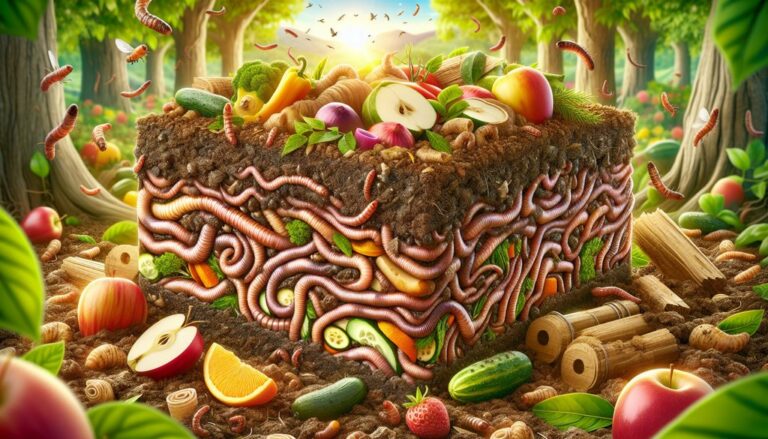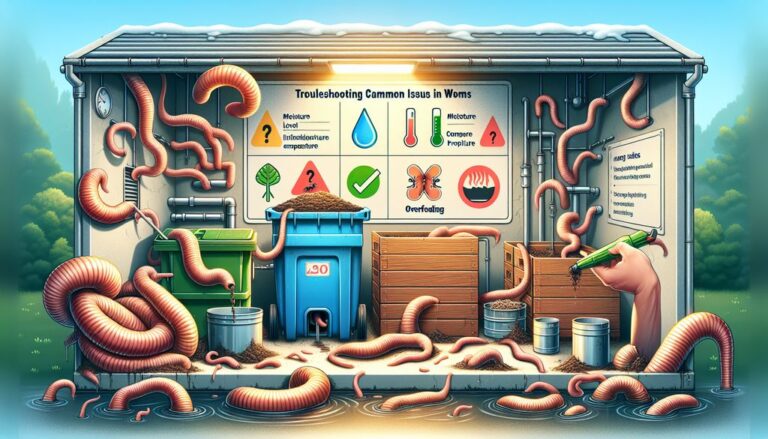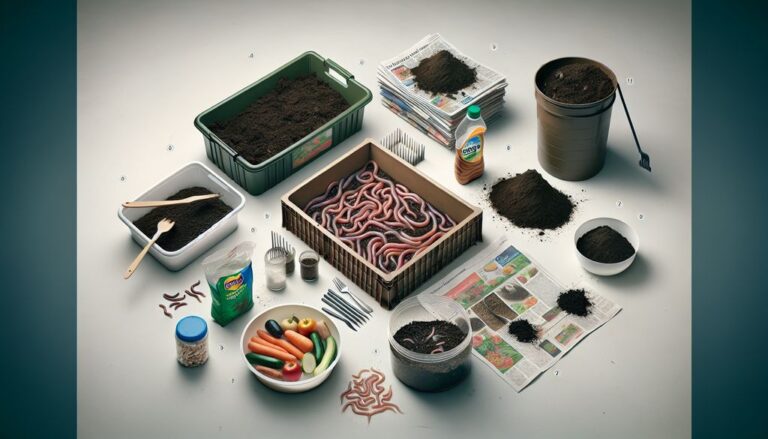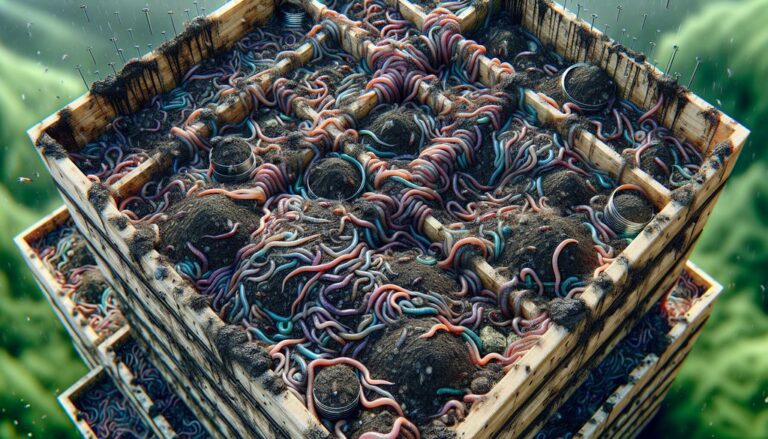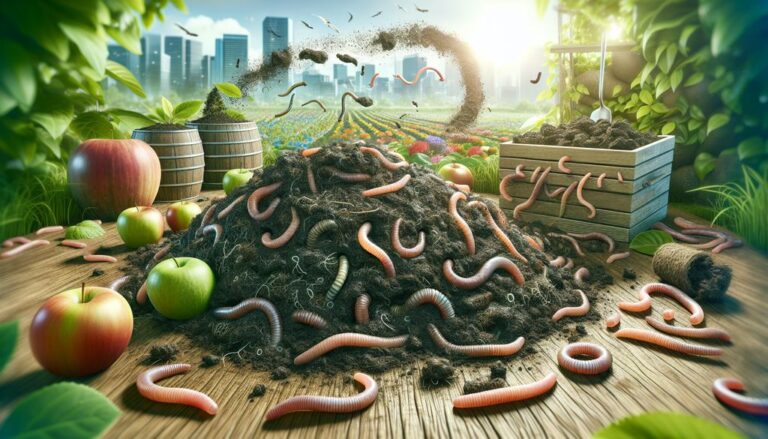Feeding your worms is an essential part of maintaining a healthy worm environment. By understanding the nutritional needs of worms and following best practices for feeding, you can ensure the well-being of your worm population. This guide will explore the dos and don’ts of feeding your worms, as well as key takeaways to keep in mind.
Key Takeaways
- Understand the nutritional needs of worms to provide a balanced diet
- Choose the right foods for your worms to promote their health
- Avoid harmful foods that can negatively impact your worm population
- Regulate moisture levels in the worm bin to create an optimal environment
- Prevent mold and foul odors in the worm habitat for a healthy living space
The Importance of Worm Nutrition
Understanding the Nutritional Needs of Worms
To ensure the health and productivity of your worms, it’s crucial to understand their nutritional requirements. Worms thrive on a balanced diet that includes a variety of organic materials. These can range from fruit and vegetable scraps to shredded paper and cardboard. Worms are natural decomposers, which means they break down organic matter and, in the process, produce valuable compost for your garden.
Worms require a diet rich in microorganisms, which they obtain from decomposing organic matter. This process not only nourishes the worms but also contributes to the creation of high-quality compost.
Here’s a simple list of what to feed your worms to keep them healthy:
- Fruit and vegetable scraps (avoid citrus and onions)
- Coffee grounds and filters
- Tea bags (remove staples)
- Eggshells (crushed)
- Leaves and yard trimmings
- Shredded newspaper, paper, and cardboard
Remember, a diverse diet helps maintain a robust worm population capable of effective composting. By providing the right mix of nutrients, you can enjoy a flourishing worm bin that supports your gardening efforts.
Balancing Protein and Carbohydrates for Worm Health
After understanding the nutritional needs of your worms, it’s crucial to balance their diet with the right mix of proteins and carbohydrates. Worms require both macronutrients for optimal health and efficient composting. Proteins are essential for their growth and reproduction, while carbohydrates provide the energy they need to process the organic waste in your bin.
To maintain this balance, consider the following tips:
- Introduce a variety of food scraps such as fruit and vegetable peels, which are high in carbohydrates.
- Add protein-rich materials like coffee grounds and small amounts of well-crushed eggshells.
- Avoid overfeeding protein as it can lead to an acidic environment, which is harmful to worms.
Remember, moderation is key. Overfeeding can cause problems such as foul odors and attract pests. Aim for a balanced diet to keep your worms thriving.
Regular monitoring of your worm bin will help you adjust the feed ratio and ensure a healthy diet for your worms. Keep track of what you add to the bin and observe how your worms are doing. If you notice any issues, tweak their diet accordingly. A happy worm bin is a sign of a balanced diet and a healthy worm population.
Feeding Your Worms: Best Practices
Choosing the Right Foods for Your Worms
Selecting the appropriate food for your worms is crucial for their health and the quality of compost they produce. Worms thrive on a varied diet rich in organic matter. Fruits, vegetables, coffee grounds, and eggshells are excellent choices. However, it’s important to avoid overfeeding and to chop larger items into smaller pieces to aid in decomposition.
Here’s a simple list of worm-friendly foods:
- Fruit and vegetable scraps (avoid citrus and onions)
- Coffee grounds and filters
- Tea bags (remove staples)
- Eggshells (crushed)
- Leaves and grass clippings (in moderation)
Remember, a happy worm bin is a productive one. Balance the diet of your worms with a mix of nitrogen-rich ‘greens’ and carbon-rich ‘browns’ to maintain a healthy composting environment.
It’s also essential to avoid foods that can harm your worms or create an imbalance in the worm bin. Meat, dairy, oily foods, and spicy items should be left out of your worm’s diet. These can attract pests, cause odors, and are difficult for worms to process.
Avoiding Harmful Foods for Your Worms
When feeding your worms, it’s crucial to know which substances can be detrimental to their health. Avoiding harmful foods is as important as providing the right nutrients. Certain items that should never be added to your worm bin include meats, dairy products, oily foods, and salty snacks. These can attract pests, cause foul odors, and even harm your worms.
To maintain a thriving worm bin, be vigilant about the foods you exclude.
Here is a list of items to avoid:
- Citrus fruits and peels (too acidic)
- Onions and garlic (can be toxic)
- Processed food (contains preservatives and chemicals)
- Spicy foods (can irritate worms)
- Non-biodegradable materials (plastics, metals, etc.)
By steering clear of these items, you’ll foster a safer, more productive environment for your worms to live and reproduce.
Maintaining a Healthy Worm Environment
Regulating Moisture Levels in the Worm Bin
Maintaining the right moisture level in your worm bin is crucial for the health and productivity of your worms. Too much moisture can lead to odors and mold, while too little can dehydrate and harm your worms. Aim for the consistency of a wrung-out sponge, which is typically around 80% moisture. Here’s how you can regulate moisture levels:
- Add dry bedding such as shredded newspaper or cardboard to absorb excess moisture if the bin is too wet.
- Sprinkle water over the bedding if the bin is too dry, ensuring even distribution.
- Monitor regularly with a moisture meter or by hand to keep conditions optimal.
It’s important to strike a balance. Your worms need moisture to breathe through their skin, but they also require enough air flow to prevent anaerobic conditions that can be harmful.
Remember, the health of your worms is directly linked to the environment you provide. Regular checks and adjustments will keep your worm bin in top condition.
Preventing Mold and Foul Odors in the Worm Habitat
Preventing mold and foul odors in your worm habitat is crucial for the health of your worms and the comfort of your surroundings. Regular maintenance and monitoring are key to a healthy worm bin.
To avoid mold and unpleasant smells, follow these simple steps:
- Ensure proper aeration of the worm bin by turning the bedding material occasionally.
- Balance the worm bin’s moisture levels; it should feel like a wrung-out sponge.
- Avoid overfeeding your worms, which can lead to rotting food and odor.
- Chop food scraps into smaller pieces to speed up the decomposition process.
- Add dry bedding materials, such as shredded newspaper or cardboard, to absorb excess moisture.
By adhering to these practices, you can maintain an odor-free and mold-resistant worm habitat, creating a thriving environment for your worms to work and live in.
Remember, a healthy worm bin should not emit foul odors. If you notice a persistent smell, it’s a sign that something is out of balance. Addressing issues promptly will keep your worms happy and your worm bin productive.
Conclusion
In conclusion, feeding your worms requires a balance of care and attention. By following the dos and avoiding the don’ts, you can ensure the health and vitality of your worm population. Remember to provide a suitable environment, monitor their food intake, and avoid harmful substances. With these essential guidelines, you can become a successful worm caretaker and contribute to the well-being of your garden ecosystem.
Frequently Asked Questions
What do worms eat?
Worms eat a variety of organic matter, including fruits, vegetables, coffee grounds, and eggshells.
How often should I feed my worms?
Feed your worms once or twice a week, depending on the size of your worm bin and the amount of organic waste it contains.
Can I overfeed my worms?
Yes, overfeeding can lead to a buildup of excess food and cause issues such as foul odors and mold growth in the worm bin.
What foods should I avoid feeding to my worms?
Avoid feeding your worms citrus fruits, onions, garlic, spicy foods, meat, dairy, and oily/greasy foods.
How do I regulate moisture levels in the worm bin?
Maintain proper moisture levels by adding damp bedding materials and monitoring the overall moisture content of the worm bin.
What should I do if my worm bin develops a foul odor?
If your worm bin develops a foul odor, check for overfeeding, excess moisture, or the presence of harmful foods. Adjust feeding and moisture levels as needed to eliminate the odor.

